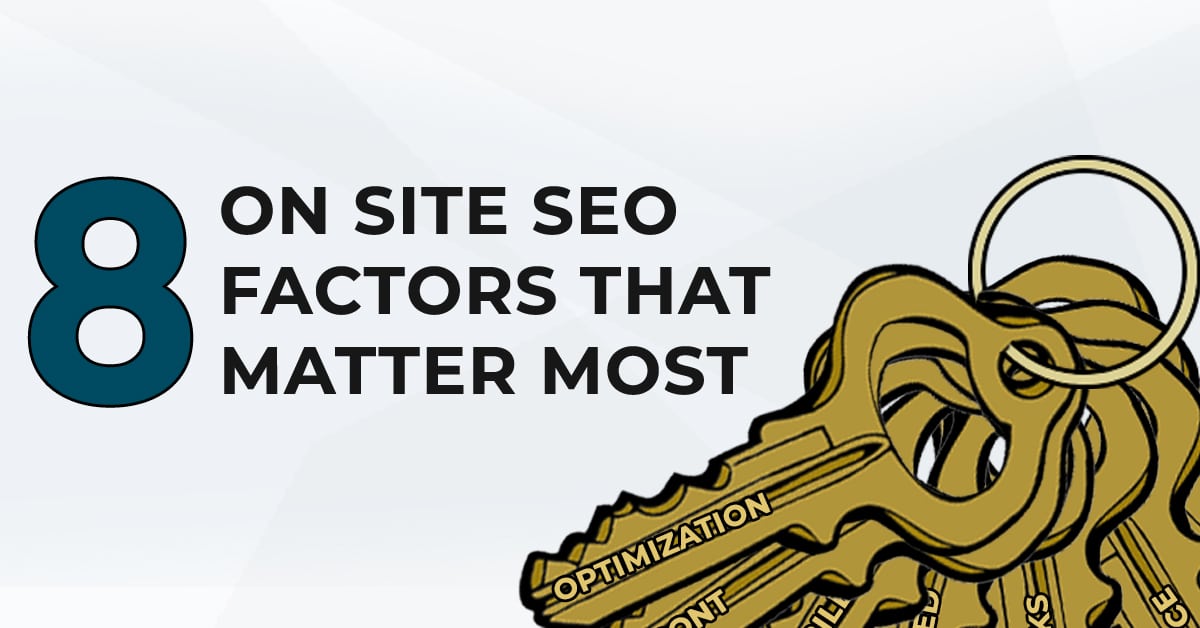8 On-Site SEO Factors That Matter Most
Search Engine Optimization, otherwise known simply as “SEO,” is the digital marketing method to improve ranking in Google. Google uses a complex algorithm to determine your website’s worth for a specific search query. This directly influences your position on the search page when someone enters a query in Google. This search engine is by and far the dominant tool used by the online community for navigating the internet, so SEO is a factor you must attend to for your website to find success in bringing in traffic. We will talk specifically about the On-Site SEO factors in this article.
While there are countless tweaks you can make to your website to cultivate a good SEO ranking, it can appear to be a daunting task. To make it simple for you, we’ve collected the 8 most vital facets of search engine optimization for your research needs. If we did our job correctly, you didn’t have to click on page 2 to find this on your Google search!
Length of Content
Your content is ultimately the main driver of SEO success so make sure to use the proper headings! This is both a functional and aesthetic choice for your readers, as well as an indicator to Google that your page is of higher quality. You would be surprised how many websites and blogs neglect to organize their headings; get a leg up by having your content lined up correctly with <H2>, <H3>, and so on.
Keyword research is the key (pun only slightly intended) to the success of your content. Using the correct research methods, you can find keywords that are highly searched as well as underrepresented in terms of pages. Finding this balance of a keyword’s “supply and demand” helps your page rank higher by Google’s standards, as well as draw in interested visitors.
It’s not 100% clear on what is the ideal length for an article or page. This is likely due to the length of content not always correlating with quality. When composing your next post, aim for above 1000 words, but no need to go beyond 2500. It’s highly debated, but if you look at a few different sources, you’ll find most recommend an ideal length of 1500-2000 words. At the very least, do not go below 300, as this will hurt your ranking.
Outbound and Inbound Links
When ranking pages, Google takes into account the “linkability” of your page. In other words, this means how easy it is to link to your content, or if it’s even possible. This might seem obvious, but sometimes website owners make the mistake of putting their content in downloadable pdf files, locked behind a login, or beneath other layers.
The other side of this coin is the reputation of the sites your page links to. Google judges the legitimacy of your page partly on the legitimacy of the pages it references. Take the time to vet the sources you use and link to. This can improve your Google ranking as well as your value for site visitors.
This last part can be slightly out of your control, but it’s good to know either way! The number and quality of other pages that link to yours is a factor considered by Google when ranking your page. This includes the ranking of the other site, the relevancy of the actual text linked on their page, and the trustworthiness of the site that linked to you.
As for what you can personally do, communicating with other site owners and making sure to host quality content are two ways to increase the number of links that will back up the ranking of your page.
Title Tags for SEO
Title tags are some of the most important factors that go into a good SEO ranking on Google. If you’re typing the HTML code yourself, it’s necessary to put “<title>” on both sides of the desired page title. This indicates to the search engine that this is the primary title for your page. Most website hosting services can do this for you.
Your page title should be as relevant to your topic as possible. This is important to show the accuracy of your content to both Google’s web crawler and potential site visitors alike. To create an effective title, you should aim for something simple and include attractive keywords. It’s also a good idea to utilize numbers as well.
What about your company or brand name? For individual articles, having the brand name on each page can appear repetitive if you have multiple results show up in one search query. For the main page(s) on your website, it’s a good idea to include it.
Non-Duplicate Content
It’s common for websites to recycle subjects for blog posts and such. This can be an effective way of keeping your content up-to-date and relevant, but there is an unexpected aspect you need to watch out for. Duplicate content is a red flag for Google’s ranking system, lowering the trustworthiness and authority of your domain.
There are two ways to prevent the negative effects of a website filled with similar content. One is to make sure that you’re varying the content widely enough to avoid your rank taking a hit. The second tactic is making good use of a canonical tag. This helps the Google algorithm not crawl pages unnecessarily, or mark them as duplicate.
Implementing a canonical tag takes some HTML handiwork, and although we could go over the many options, it might be more helpful to use Google’s own guide.
Website Load Speed
Is your website optimized with HTML to provide quick loading times? Besides robbing you of organic traffic, long load times worsens your ranking in Google’s system. It’s helpful in many ways to have a well-oiled website up and running.
If your site loads in 2.9 seconds, it is faster than approximately 50% of the web. Some easy fixes for decreasing load times on your site are cutting down on the number of redirects needed to reach pages, applying HTML 5 framework, and minimizing image sizes. These are all effective on both desktop and mobile versions of your site.
(Tip: It’s a good idea to find out whether your desktop or mobile site receives more traffic before tearing into one or the other)
Mobile-Friendliness
Since 2019 Google has switched to mobile-first ranking. Mobile-first ranking means that Google judges your mobile site for ranking, as opposed to the desktop version of your site. Accordingly, you should pay much more attention to the SEO elements of your page’s mobile version.
This was a major change from ranking desktop sites, and the effect has been obvious. If you don’t have a mobile-friendly version of your pages, you can expect significantly less traffic. Not only because Google is penalizing your ranking, but it’s a pain for your users!
WhoIs the Owner? SEO Penalization
If you’re reading a guide for optimizing SEO, it is likely not the case that you are a spammer trying to create such a website. In that case, why do you need to understand the role of WhoIs in search engine optimization? While you may never encounter issues with WhoIs penalties, you should be aware of its effects.
A WhoIs penalty comes from a website owner being flagged as a spammer. It’s often the case that a spammer who creates one website will create more, so Google utilizes non-public data to keep track of these owners. The records go deeper than just an IP address, but the website domain name itself can be flagged.
It’s important to make sure that a domain name you buy does not come with a WhoIs penalty. In most cases, this shouldn’t be an issue, particularly if you are buying from a reputable source online. If you suspect there may be a problem with a WhoIs penalty on your domain, contact Google to have it straightened out.
If you’re a spammer, sorry bud.
Covering Topics In-depth
It’s one thing to stuff keywords into your content left and right. It’s a whole different game to utilize these keywords with helpful and valuable writing. Your website visitors get smarter every year, and many recognize a low-effort blog post meant to pull in traffic and nothing more. If your content is purely regurgitated and paraphrased content written by a kid on Fiverr, don’t expect to retain many of those page visitors.
Although you’re certainly putting out content for real humans to read, we can’t ignore the fact that you’re trying to get your page ranked higher by Google. The thing to remember is more in-depth and knowledgeable writing generally includes other smaller keywords. This will get noticed by Google’s web crawler as well as other potential readers who are looking for more niche answers.
Professional SEO Services
When it comes to search engine optimization, you can’t really afford to be ranked poorly and fight against the current for decent traffic. If you’re getting tired of trying to get ahead of the pack while juggling your other responsibilities, it might be time to find someone who can ensure that you’re getting ranked correctly.
Don’t settle for the status quo! No to the Quo is built around this very attitude. Contact us to book a FREE strategy session, and see how we can help you. We want to bring your vision to life, and getting your site in front of more folks is precisely the key to that. Let’s build something beautiful together.
SEO No To The Quo



